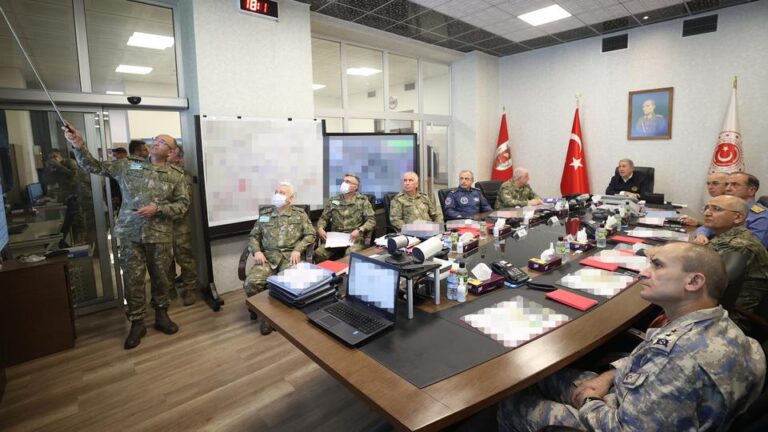The exports Türkiye conducted using the Turkish lira more than doubled in November from a year ago, according to official data, adding to Ankara’s drive to expand the share of the national currency in foreign trade.
Türkiye has long sought to expand non-dollar international trade and has been promoting greater use of national currencies in mutual settlements, particularly with its major partners, including China, Russia, Iran and Gulf countries.
Outbound shipments made using the lira leaped by 114% year-over-year in November to TL 15.68 billion ($841 million), according to the Trade Ministry data, maintaining a trend that has gained momentum this year.
Imports rose at an even faster pace, surging to TL 35.63 billion last month. The total volume of lira used in the November foreign trade reached TL 51.31 billion.
The January-November exports using the national currency jumped 94% year-over-year to TL 113.7 billion, the data showed, while imports rose to TL 234.8 billion, pushing the total trade volume to TL 348.5 billion.
Gradual expansion
The drive gradually expanded throughout this year and gained further momentum as of August. Exports and imports made with lira in January stood at TL 7 billion and TL 12.1 billion, respectively, according to the data.
They reached TL 10.36 billion and TL 23.82 billion in August and jumped to TL 16 billion and TL 28 billion a month later, respectively. The volume of lira in foreign trade rose from TL 19.15 billion at the beginning of 2022 to TL 34.19 billion in August, before leaping to TL 44 billion in September.
Some 7,182 companies opted for the national currency in exports to about 162 countries in November, according to the official data. The number of firms stood at 6,894 in October.
One of the main drivers of Türkiye’s economic growth this year, exports hit record-high volumes throughout the first 11 months of this year. Yet, a global slowdown has put a drag on foreign demand, notably among Türkiye’s largest trade partners, spearheaded by Europe.
Outbound shipments rose 1.9% year-over-year to $21.9 billion in November, while imports jumped 14% from a year earlier to $30.7 billion, driven mainly by steep rises in energy and commodity prices after Russia’s invasion of Ukraine. Foreign trade volume rose 8.6% from a year ago to $52.51 billion.
Exports from January through November jumped 14% from a year ago to $231 billion, while imports were up 36.6% to nearly $331.1 billion, the data showed. Foreign trade volume was up 26.3% to $562.35 billion.
Expanding efforts elsewhere
Meanwhile, some of Türkiye’s major trade partners that are members of the Shanghai Cooperation Organisation (SCO) agreed in September to take steps to increase the use of national currencies in trade between their countries.
The group comprising China, India, Russia and Pakistan alongside four Central Asian states said “interested SCO member states” had agreed on a “roadmap for the gradual increase in the share of national currencies in mutual settlements,” and called for an expansion of the practice.
Moscow is seen as the main driver of the push as it tries to reduce its reliance on the U.S. dollar and other Western currencies for trade following the imposition of sweeping new Western sanctions in response to its invasion of Ukraine in February.
Russia is increasingly asking buyers of its energy to pay in rubles to help bolster its currency. Most international energy deals are settled in U.S. dollars or euros.
The Russian gas giant Gazprom recently said China and Türkiye would pay for some of its Russian gas supplies in rubles.
Türkiye last month confirmed it had started paying for some of its natural gas from Russia in rubles. Energy and Natural Resource Minister Fatih Dönmez said that the share of local currency payments in energy trade with Russia would increase in the coming months.
Leading oil producer Iran, like Russia subject to broad international economic and financial sanctions, is also on the verge of joining the SCO.
Source : DailySabah







